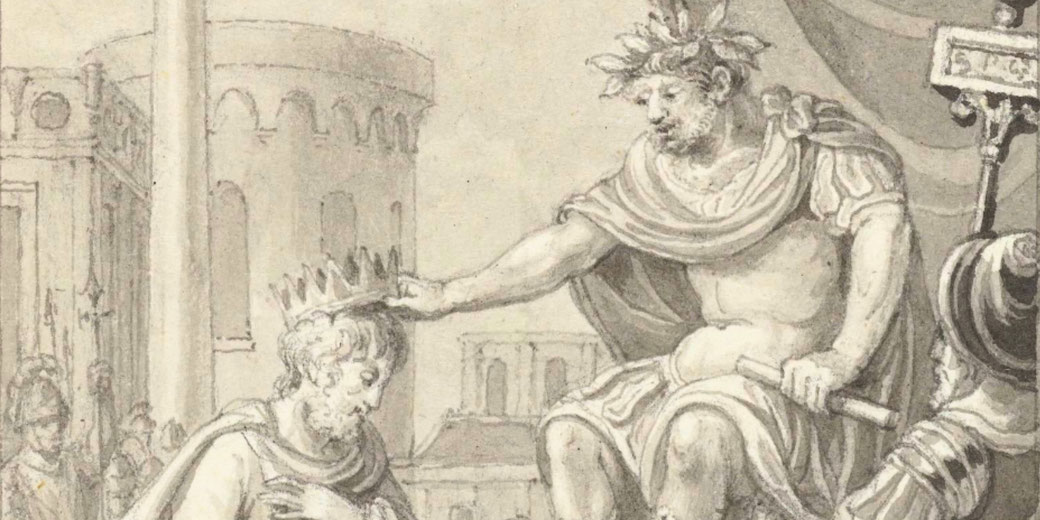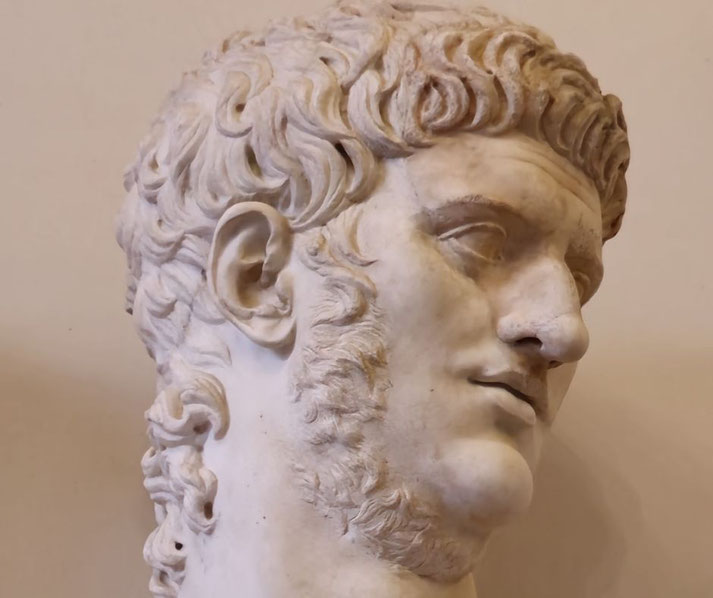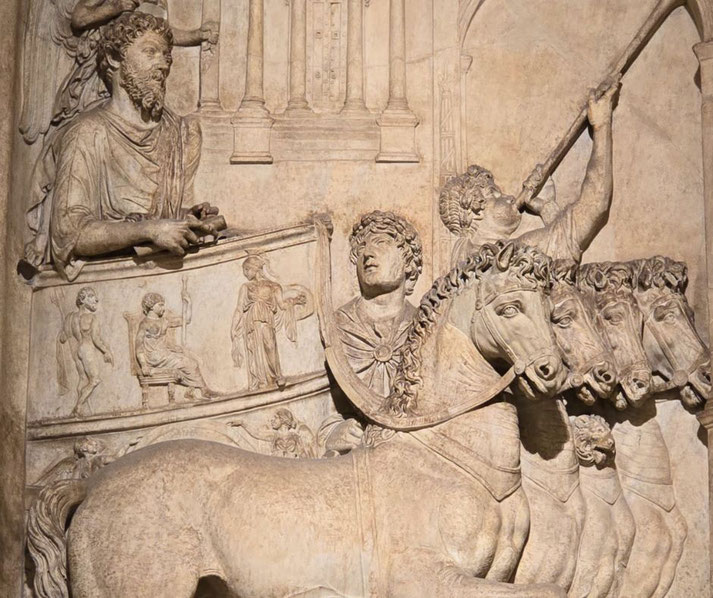The embarrassing spectacle when Emperor Nero competed in the Ancient Olympics

An emperor turned a sacred athletic festival into his private stage when Nero demanded honours that the Olympic rules did not allow and altered the schedule to suit his travel plans and personal vanity.
Ultimately, his conduct showed how imperial power could impose a heavy-handed spectacle to silence critics.
When a narcissist became Roman emperor
In AD 54, the death of Emperor Claudius made his sixteen-year-old stepson Nero the head of the Roman Empire and placed absolute authority in the hands of a teenager with little military or political experience.
He had been born into the Julio-Claudian dynasty, which had linked him by blood to Augustus through his ambitious mother Agrippina.
Nero lacked some of the qualities that had previously kept the imperial succession steady.
He had entered power with the public support of the philosopher Seneca and the commander Burrus, yet his growing desire for personal glory gradually weakened any sense of traditional Roman restraint.
Rather than devoting his rule to warfare or administration, Nero mainly chose to pursue fame through music and theatre presented as public spectacle, and he often insisted that his artistic talent matched or arguably surpassed the legendary poets and actors of Greece.
Imperial rules, which discouraged personal exhibition, had restrained earlier emperors from excessive displays.
However, Nero ignored that earlier practice, and he turned his court into a stage upon which he could act out his fantasies.
As flatterers surrounded him and court officials competed for favour, the emperor increasingly believed that his artistic gifts deserved recognition from the wider world.
This led him to orchestrate performances that placed him in the centre of Roman public life.

Nero's obsession with all things Greek
Long before his journey to Greece, Nero had studied Greek philosophy, admired Greek architecture, and incorporated Greek titles into official correspondence, which led him to believe that true cultural excellence originated in the eastern Mediterranean.
Greek tragedy and epic poetry particularly captured his interest. It was the world of athletic contests and musical competitions that truly appealed to his desire for acclaim, especially since public praise held more significance for him than Roman notions of virtue.
Within his private theatre in Rome, he forced senators and citizens to witness elaborate performances in which he sang, acted, and recited, and he often demanded applause that matched the ovations once reserved for military triumphs.
No emperor before him had participated so publicly and theatrically in such events, which made his conduct exceptional in both extent and frequency.
Yet, Nero was convinced that an emperor’s greatness lay in cultural superiority rather than military discipline.
He founded the Neronia in AD 60, a festival that mimicked the Greek games by including events in athletics, poetry, music, and performance.
Modelled on the Greek cycle of games held every four years, the Neronia was designed to elevate the emperor as its central attraction.
To ensure his triumph, he almost always appeared as the star competitor.
This popular support encouraged him to seek even greater stages, as the spectacle proved entertaining for many urban citizens and Nero’s generosity provided them with games, gifts, and grain.
As he looked outward, he turned his attention to Greece itself and identified the Olympic Games as the perfect venue to showcase his claimed greatness.
The Olympics before Nero's arrival
Since their origins in the 8th century BC, the Olympic Games had operated as a religious festival dedicated to Zeus, which combined sacred ritual with highly disciplined athletic contests that celebrated physical excellence and Greek identity.
At Olympia, athletes from across the Greek world arrived every four years to compete in running, wrestling, boxing, pankration, discus, javelin, and chariot racing.
Spectators gathered under the protection of a formal truce that suspended warfare during the games.
A panel of specially selected judges from Elis, who were known as the Hellanodikai, enforced strict rules and punished violations with fines, floggings, or disqualification.
Their authority protected the honour of the games and ensured fairness among competitors.
Only free Greek men who could prove their ancestry and meet strict eligibility requirements overseen by the Hellanodikai were permitted to participate.
For those who won, their names were recorded in stone, and victory odes preserved their fame for generations.
Roman emperors had previously admired the Greek athletic tradition. However, they never attempted to enter the contests.
The Olympic Games continued to be a Greek religious institution, and foreign rulers understood that interference would be viewed as religiously offensive.
For centuries, the rules and schedule continued unchanged. That changed with Nero’s arrival.
How Nero made the entire Games about himself
By AD 67, Nero had toured the eastern provinces for several months and had issued decrees that promoted Greek culture and demanded public displays of loyalty to his person.
He had visited major cities such as Athens, Delphi, and Corinth, and he had performed at each location and had claimed victories in every contest.
The organisers moved the date of the games, which reportedly accommodated his travel plans, as he had ordered the Greek authorities to postpone the sacred timetable upon learning that the next Olympic Games were scheduled for AD 69, which made Nero's interference unprecedented in Olympic history.

To ensure a favourable outcome, Nero demanded that the programme include competitions in poetry performed through acting and music, which had not previously been part of the official Olympic events.
He entered every new event, and he insisted on competing in the traditional tethrippon chariot race with a decemjugis, or ten-horse team, which far exceeded the standard four-horse quadriga arrangement.
During the race, he lost control of the reins and fell from the chariot before reaching the finish line, but the judges awarded him the victory regardless, likely because they were under pressure from his group of followers.
In total, Nero received crowns for every event he entered. Cities erected statues in his honour, crowds chanted his praises, and poets composed verses to celebrate his triumphs.
Ancient sources reported that he claimed to have won 1,808 individual prizes throughout his tour of Greece, a figure that was likely exaggerated to suit imperial propaganda.
To the casual observer, the emperor had conquered Olympia. In fact, the entire ceremony had become a carefully staged performance, stripped of genuineness and enforced by fear rather than admiration.
The impact of Nero's manipulation of the Games
Greek intellectuals who attended the games later described their disgust. They had witnessed an emperor twist a sacred tradition to satisfy his pride.
Roman historians, who included Suetonius and Cassius Dio, recorded the events as a disgrace to imperial dignity.
They mocked the idea of awarding a crown to a man who had fallen during the race and failed to complete the course.
Privately, many local officials in Greek cities expressed anger at the pressure placed on them to rewrite the sacred programme.
Publicly, most kept silent, as any criticism risked imperial punishment. For those who valued the ancient customs, the spectacle at Olympia showed the consequences of unchecked power.
After Nero’s suicide in AD 68, the Greek authorities acted swiftly, as they removed his statues, erased his name from inscriptions, and deleted his supposed victories from the official Olympic records.
Cities such as Delphi and Olympia had largely restored the original schedule and had removed any trace of his interference.
By then, however, much of the damage had already been done.
Why did Nero do it?
Nero believed that much of his glory came from admiration, and he imagined himself as a cultural hero rather than a traditional Roman ruler.
He effectively equated applause with greatness and treated the Olympic Games largely as a theatre in which he could perform for the world.
To achieve this, he forced others to change the rules, adjust the schedule, and reward his participation regardless of merit.
For Nero, Greek heritage often offered a mirror that showed his ideal self. He did not understand the purpose of the games or the religious devotion they embodied.
Instead, he interpreted them as another opportunity for personal approval. As a result, he mistook ceremony for achievement and accepted insincere praise instead of real praise.
By demanding worship through performance and rewriting sacred tradition to suit his fantasies, Nero made clear the considerable gap between illusion and reality.
The spectacle of AD 67 did not prove his greatness. Instead, it exposed his urgent need for approval and showed how imperial power could silence criticism and make the ceremonies largely meaningless.
What do you need help with?
Download ready-to-use digital learning resources
Copyright © History Skills 2014-2025.
Contact via email
With the exception of links to external sites, some historical sources and extracts from specific publications, all content on this website is copyrighted by History Skills. This content may not be copied, republished or redistributed without written permission from the website creator. Please use the Contact page to obtain relevant permission.





